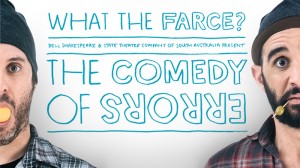The Comedy of Errors | Bell Shakespeare
- November 17th, 2013
- Posted in Uncategorized
- Write comment

“Two sets of identical twins are separated at birth when they’re rescued from a shipwreck. And when they end up in the same shifty, transitory port-town of Ephesus fully grown, we join them on their bizarre journey of reconciliation. As they collide unknowingly with each other’s friends and family, it’s not long before this absurd tale of mistaken identity and far-fetched coincidence unfolds in chaotic hilarity.”
The strength of every comedy lies in its truth. And every truth needs comedy to help find its way into our hearts and minds. At the core of The Comedy of Errors is a story of identity, violence and reconciliation: we see the unfortunate disparity between master and servant, between the home-dwellers and the displaced visitors. The greatest tragedy in The Comedy of Errors is that everyone is honestly telling the truth, no-one is being underhanded nor deceptive and as such the injustice of the violence is amplified. It’s a really interesting play that looks to the idea of familial loyalty as the bedrock to patience and understanding.
So the truth of the play is that sometimes things are, despite all intents and purposes, confusing. Sometimes, regardless of truth, honesty and clear viewed witness – there will be conflict. Sometimes despite our own loyalties we will feel abandoned and betrayed. Without these truths – the message of the comedy (compassion and understanding) – is nothing more than a colourful distraction.
And this production is just that.
When characters become caricature, compassion disappears – and the audience laughs at, not with predicament.
Why is this a problem for me with this production?
Because within the Comedy of Errors is a scene wherein Antipholus of Syracuse (Nathan O’Keefe) discovers that he has fallen in love with his “wife’s” sister, Luciana (Jude Henshall) – for this scene to mean anything we have to believe that Antipholus can genuinely find something in Luciana to love – and that it is possible that she might be troubled by this – if it is all too broad and howling, that genuine tension is lost. We will always consider that there would never be any genuine threat of this coming to fruition. When the couples finally pair up at the conclusion of the play – we have to feel that the world is now restored. But instead for me, with this production, I felt the world was mad. Adriana is a superficial tyrant – and no wonder her Antipholus seeks favours with other women. Luciana is superficial and vacuous and as such I believe her Antipholus is equally so. The two redeeming characters are then the separated Dromios (Renato Musolino and Hazen Shammas)- as their portrayal, though true to clowning is softer, sweeter, more truthful.
I found it difficult to reconcile the very sincere and genuine address of Eugene Gilfedder’s Egeon with the lisping cartoonish flying nun (Emilia of Babylon). I found it difficult to understand why Ant.of Syracuse would find Luciana attractive. I found the most real moments – the genuine, smile-worthy moments locked inside the discovery of the Dromios (in particular Renato Musolino).
To deny the darker side of Comedy of Errors is to deny the play’s context – the social commentary of abandoning ancient feudal relationships between father/child, husband/wife, Master/slave. And it must not be ignored that we are seeing this play in our own unreconciled social context. We are a nation who’s government restricts migration. There is more afoot in this play, and I respectfully disagree with director Imara Savage in her director’s note which claims that “it was never meant to be a profound study of human nature.”
I can’t imagine any play NOT being a profound study of human nature, because after all – there is nothing more self-reflexive than human watching each other, is there?
This production will satisfy many on the single level it is offered – a bright and pacey contempo dance party of night hallucinations. But for me, who thinks the original plays setting in stark daylight has more sinister implications about truth, this seems a very simplistic exercise in laughing AT gags instead of laughing WITH the play’s unwieldy situation.
More information visit: Bell Shakespeare’s website
SYDNEY | 12 November – 7 December
Sydney Opera House, Playhouse
All Performances (excluding Saturday 7:30pm)
Adult $68/ Concession* $58 /Groups of 8 or more $58/ Under 30† $33
Saturdays at 7:30pm
Adult $72/ Concession* $65/ Groups of 8 or more $65/ Under 30† $45
Germaine Greer said this play “wears its profundity lightly”, which sounds a good deal more insightful to me. In a recent Irish production they came up with the tremendously clever idea of playing Luciana as the older sister, when it is usually assumed she is the younger. Having feared she would never be loved and married, it suddenly made sense that she might feel tempted by the honeyed words of a man she believes is entirely off-limits.